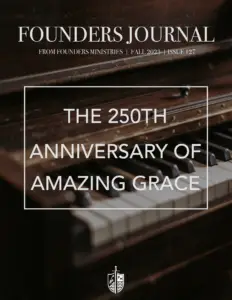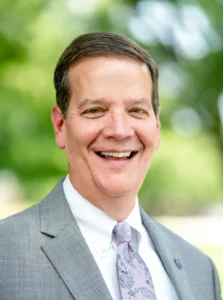Yea, when this flesh and heart shall fail,
and mortal life shall cease:
I shall possess, within the veil,
a life of joy and peace.
John Newton’s Amazing Grace was originally titled “Faith’s Review and Expectation.” By faith and in the power of the Holy Spirit, Newton “reviewed” his life to see it from the lens of reality: “Amazing grace! How sweet the sound That saved a wretch like me!” One of the enduring qualities of Amazing Grace is that believers have identified with the brutal honesty of the text as they reflect and personalize the darkness of their past and the hope of their future in Christ.
The preacher-hymn writer beautifully and poetically captured his “life in review” and his eternal “expectation” of hope everlasting in verse five of this powerful and popular hymn: “Yea, when this flesh and heart shall fail, And mortal life shall cease, I shall possess, within the veil, A life of joy and peace.” For Newton, there was no question as to “if” his flesh would give out and “if” his heart would stop beating; it was for him, “when” the cessation of life would take place. Indeed, the day will come when “mortal life shall cease.”
But for Newton, and subsequently those of us who have the joy and privilege of singing this hymn, there seems to be implications far beyond the ultimate last expansion of air in the lungs and the final beat of the heart. Throughout the hymn, “Amazing Grace,” the wise pastor might also be pointing worshipers to the reality that flesh and hearts fail on a daily basis. There is no lack of sin in the life any believer, and a realization of such a reality is a step toward a “life of joy and peace” through the work of Jesus Christ.
In the compilation of the Letters of John Newton, first published in 1960, Newton wrote the following in his missive titled, “Christ All-Sufficient:”
We are never more safe, never have more reason to expect the Lord’s help, than when we are most sensible that we can do nothing without him. This was the lesson Paul learnt, to rejoice in his own poverty and emptiness, that the power of Christ might rest upon him. Could Paul have done anything, Jesus would not have had the honour of doing all. This way of being saved entirely by grace, from first to last, is contrary to our natural wills: it mortifies self, leaving it nothing to boast of…in truth, such a poverty of spirit is the best mark we can have of an interest in his promises and care.”[1]
To the recipient of the letter, Newton makes it clear that salvation is “entirely by grace.” Life itself is lived in the power of Christ alone and there is reason for believers to rejoice in their poverty. As the Apostle Paul reminded the church at Corinth: “My grace is sufficient for you, for my power is made perfect in weakness. Therefore, I will boast all the more gladly about my weaknesses, so that Christ’s power may rest on me”’ (2 Cor. 12:9).
The “life of joy and peace” will indeed come when Christ calls the believer home, but there is the very present reality that believers have a place “already” in the heavenlies seated next to Christ as they submit to the certainty that we can do “nothing without him.” As the Apostle Paul reminded the church at Ephesus and us: “But God, being rich in mercy, because of the great love with which he loved us, even when we were dead in our trespasses, made us alive together with Christ—by grace you have been saved— and raised us up with him and seated us with him in the heavenly places in Christ Jesus, so that in the coming ages he might show the immeasurable riches of his grace in kindness toward us in Christ Jesus” (Eph. 2:4-7). Newton reminds believers of the eternal “joy and peace” that will eventually come “on that day.” But there is a prevailing realism in the “immeasurable riches of his grace toward us in Christ Jesus” as we live life now.
Even though mortal life will cease and our hearts will stop, Newton turns the darkest of realities into a glorious hope in just a few choice words: “I shall possess within the veil, a life of hope and peace.” The veil refers to the curtain that functioned to separate the holy place from the holy of holies in the temple. In other words, the prohibitive function of the veil conveyed the restrictive nature placed on Israelite worship.[2] But for those in Christ, the access to God was made complete. As the writer of Hebrews describes: “Therefore, brothers and sisters, since we have confidence to enter the Most Holy Place by the blood of Jesus, by a new and living way opened for us through the curtain, that is, his body, and since we have a great priest over the house of God, let us draw near to God with a sincere heart and with the full assurance that faith brings, having our hearts sprinkled to cleanse us from a guilty conscience and having our bodies washed with pure water” (Hebrews 10:19-22).
“Within the veil” verbalizes a metaphor as poetically intense as it is theologically profound. It carries with it an amazingly pertinent and diverse body of gracious gifts given to believers that all arise from the broken and torn body of Christ—“that is, his body”—that constituted the heart of his work of reconciliation. “Within the veil” we have forgiveness. “Within the veil” we are justified. “Within the veil” we are reconciled to our most dangerous enemy. “Within the veil” redemption from the slave-block of iniquity is executed. “Within the veil” the promise and energy for sanctification reside. “Within the veil” the certainty of perseverance is rooted. “Within the veil” assurance becomes a source of unmitigated joy. “Within the veil” the opening of death into heaven and eternal life makes that final breath an entrance to the status of “far better” (Philippians 1:23).
Another compelling word fittingly placed by Newton in verse five is the term, “possess.” In context he writes, “Yea, when this flesh and heart shall fail, And mortal life shall cease, I shall possess, within the veil, A life of joy and peace.” Through the completed work of Christ, Newton encourages worshipers to know without a doubt that Jesus owns and holds and keeps their position for them within the veil – within the presence of the most Holy God. Believers possess their place within the veil not because of their efforts, but because of Christ’s perfect sacrifice.
And as believers look forward to the day beyond this mortal life, there is a perfect hope and perfect “joy and peace” yet to come. In another letter, Newton wrote: “The state of true believers, compared with that of others, is always blessed. If they are born from above, and united to Jesus, they are delivered from condemnation, and are heirs of eternal life, and may therefore well be accounted happy.”[3]
The truths succinctly and beautifully articulated in just a few lines of a hymn remind us to “review” our lives and live them in the light of Christ’s presence now and in “expectation” of eternity, and we will surely “be accounted happy.”
[1] Newton, John. Letters of John Newton. (London, The Banner of Truth Trust, 1960), 178.
[2] Daniel Gurtner, “The Veil Was Torn in Two: What Happened on Good Friday.” Desiring God, accessed June 26, 2023, https://www.desiringgod.org/articles/the-veil-was-torn-in-two 2019.
[3] Newton. Letters, 148.
















